 Petzlover
Petzlover Koolie is originated from Australia but Swedish Lapphund is originated from Sweden. Koolie may grow 9 cm / 4 inches higher than Swedish Lapphund. Both Koolie and Swedish Lapphund are having almost same weight. Koolie may live 5 years more than Swedish Lapphund. Both Koolie and Swedish Lapphund has almost same litter size. Koolie requires Low Maintenance. But Swedish Lapphund requires Moderate Maintenance
Koolie is originated from Australia but Swedish Lapphund is originated from Sweden. Koolie may grow 9 cm / 4 inches higher than Swedish Lapphund. Both Koolie and Swedish Lapphund are having almost same weight. Koolie may live 5 years more than Swedish Lapphund. Both Koolie and Swedish Lapphund has almost same litter size. Koolie requires Low Maintenance. But Swedish Lapphund requires Moderate Maintenance
 The Koolie's ancestors were both the smooth coated blue merle Collie as well as the Black and Tan Collie. The dog hails from Australia.
The Koolie's ancestors were both the smooth coated blue merle Collie as well as the Black and Tan Collie. The dog hails from Australia.
Looking much like the Heeler dog, the Koolie is thought to have got its name from German immigrants to Australia who couldn’t pronounce the name ‘collie’ properly, so the name came out as Koolie. The Koolie of today is a product of a cross between the German Koolie and the Australian Dingo.
The dog has been around for a long time and in 2000, the Koolie Club of Australia was formed. It was in 2004 that the Koolie was recognized by the Australian Sporting Registrar. In May 2006, the Stockdog Committee of the Australian Shepherd Club of America accepted the Koolie as a recognized and accepted herding breed.
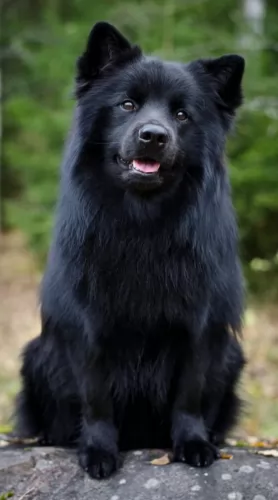 This is a Spitz type of dog from Sweden. It is Sweden’s national dog.The dog has always been used for herding and guarding livestock such as reindeer for the Sami people.
This is a Spitz type of dog from Sweden. It is Sweden’s national dog.The dog has always been used for herding and guarding livestock such as reindeer for the Sami people.
The dog is much the same as the Finnish Lapphund, and some even believe that it might be one and the same. The American Kennel Club recognizes them as two separate breeds.
It is one of the oldest Swedish dog breeds and also one of 3 Lapphund breeds.The Swedish Kennel Club recognized the Lapphund as a distinct breed in 1903.
The Federation Cynologique Internationale recognized this dog in 1944, and the United Kennel Club in 2006.
 Known also as the German Koolie or German Collie, the Koolie is a working- or herding dog standing at between 40 – 60cm in height and weighing up to 24kg.
Known also as the German Koolie or German Collie, the Koolie is a working- or herding dog standing at between 40 – 60cm in height and weighing up to 24kg.
The Koolie's coat is a merle coat pattern in red or black and possibly with some tan and is mostly short and smooth, though it can be medium length too. Depending on the coat color – red or black – the nose and eyes can be either brown or black, although eye color can also be blue or yellowish.
The Koolie is such a wonderful pet who has some excellent characteristics to his name. He is active, energetic, fun, clever, friendly and playful, but if you have him trained and socialized he becomes even more of a great family pet. He is intelligent too and will require an owner who is steady, firm, fair and consistent. You wouldn't call him an aggressive dog
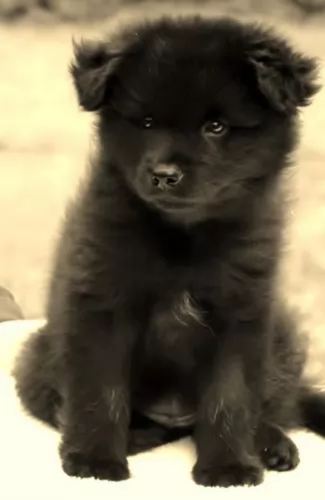 The Swedish Lapphund is a medium to large sized dog standing at between 40 to 51cm in height and weighing between 19 and 21kg.
The Swedish Lapphund is a medium to large sized dog standing at between 40 to 51cm in height and weighing between 19 and 21kg.
The head is wedge shaped and the ears erect. He has a thick double coat with fairly straight, silky hair that stands out from the body. Colors can be brown or black and sometimes there can be white markings. He sheds quite a bit, with some heavier seasonal shedding.
When you get one of these Spitz type dogs as your pet, you can be sure that you’re going to have an excellent pet and companion.
They’re independent dogs with strong wills and like to do their own thing. Training and socialization can change that and make him easy, well mannered and obedient.
They’re lively dogs and intelligent too. He is versatile, loving to be outdoors and being energetic with the children but being able to enjoy some quiet time indoors too. He is simply an excellent family pet and watchdog.
 Many people today like the idea of a ‘wild’ animal as a pet, and the Koolie, with his Dingo ancestry, can be a challenging dog breed to keep. People eventually blame these animals for having a poor temperament – meantime all they are essentially, are high-energy animals.
Many people today like the idea of a ‘wild’ animal as a pet, and the Koolie, with his Dingo ancestry, can be a challenging dog breed to keep. People eventually blame these animals for having a poor temperament – meantime all they are essentially, are high-energy animals.
If you keep a Koolie, it will be better if you were a firm, kind, patient, consistent dog owner who understands the special needs of these kinds of dogs. They’re an energetic, care-free animals who will do better on a large property or farm as he is lively and will need a good deal of exercise.
He is quite capable of being a splendid pet with training and socialization and will settle down well to family life when he is loved and cared for.
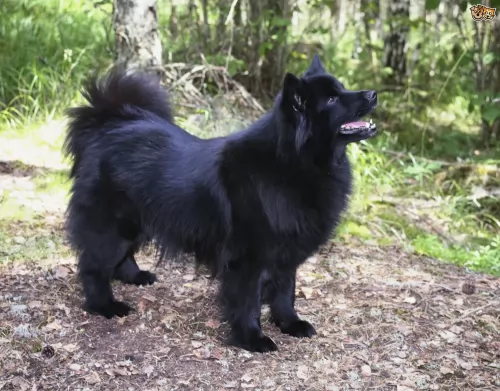 The Swedish Lapphund has always been a hardworking dog, herding reindeer for the Sami people.
The Swedish Lapphund has always been a hardworking dog, herding reindeer for the Sami people.
Today the Lapphund is a people-loving dog and wants to be constantly with his human family. He is intelligent, strong, independent, loyal, bold and loving. If you’re looking for an excellent family companion, this is it.
Do him a favor and don’t leave him outside without human companionship as he will become run-down and possibly destructive through no fault of his own. Bring him into your family and make him part of it and then he’s happy.
 The Koolie is a long-lived dog and there are records of it being able to reach 18 years of age. Because they have a diverse gene pool, you won’t find many genetic problems with this dog.
The Koolie is a long-lived dog and there are records of it being able to reach 18 years of age. Because they have a diverse gene pool, you won’t find many genetic problems with this dog.
It is always wise when you’re the owner of a dog, to look out for his health and wellbeing -
This is to prevent your Koolie picking up fatal diseases such as distemper and parvo-virus. Dogs can be vaccinated from 6 weeks of age for protection.
Working dogs like the Koolie are susceptible to parasites such as tapeworm. Worming of your dog can be included in your vet visit. Dogs with worms may show tell-tale signs such as being pot bellied, very pale gums, anemia and a dull, thinned coat.
A look at his droppings may reveal white segments or worms. Fleas are another kind of parasite and they breed quickly in warm months. Mange is a skin disease caused by small parasitic mites which can actually live inside the hair follicles of dogs. Veterinary treatment will be required.
This is when your pet’s temperature rises out of control. Dogs pant to reduce their body temperature so a dog puffing heavily is putting in extra work to reduce his body temperature.
Never leave you pet in a boiling hot car as the body becomes weak and he has difficulty with breathing. Without immediate treatment, the dog will collapse and die.
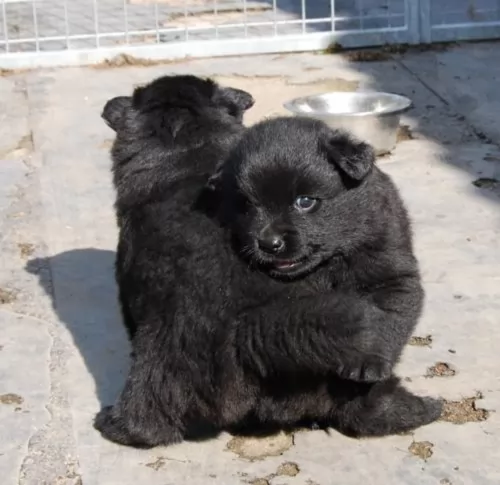 The Swedish Lapphud is a healthy dog breed, but even so he can get one of the many common dog illnesses there are.If you choose a puppy, make sure to get your pet from a reputable breeder to avoid more serious dog illnesses.
The Swedish Lapphud is a healthy dog breed, but even so he can get one of the many common dog illnesses there are.If you choose a puppy, make sure to get your pet from a reputable breeder to avoid more serious dog illnesses.
Diabetes Mellitus is a disease you might have to watch out for with this dog breed.
This is a disease of the pancreas. This organ has two groups of cells – one produces enzymes for proper digestion and the other produces the hormone insulin which regulates the level of glucose in the bloodstream.
Diabetes is when the pancreas fails to regulate blood sugar. Your dog will have increased thirst and urination, weight loss, and increased appetite.
Type I diabetes mellitus results from destruction of the insulin-producing beta cells, which is the most common type of diabetes in dogs. Dogs with this type of diabetes require insulin injections to stabilize blood sugar. Type II diabetes is more likely in older, obese dogs.
Dogs with diabetes mellitus will require insulin each day. If canine diabetes mellitus is properly regulated, prognosis for the dog is good.
 The Koolie is an intelligent dog that will benefit from training and socialization to make him obedient and able to cope in diverse situations.
The Koolie is an intelligent dog that will benefit from training and socialization to make him obedient and able to cope in diverse situations.
These dogs show an untiring enthusiasm for exercise and work and wherever you live, you will need to ensure that he gets regular exercise.
Only the very best - both home-made and commercially manufactured food - will be good enough for this energetic dog. Good quality food ensures health and longevity. Always see that there is a constant supply of fresh, cool water.
Make sure that your dog has a warm, dry place to sleep inside and that when outside, he has a cool, sheltered spot from the sun.
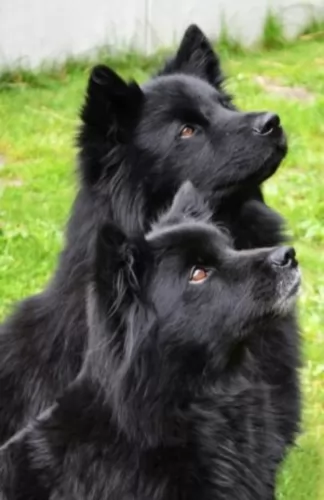 ●The Swedish Lapphund is an active dog and will require a high quality dog food. If you buy commercially manufactured dog food it should be appropriate to your dog’s age and activity levels.
●The Swedish Lapphund is an active dog and will require a high quality dog food. If you buy commercially manufactured dog food it should be appropriate to your dog’s age and activity levels.
Home-made food like boiled chicken, brown rice, spinach and sweet potatoes will do your pet the world of good, and chopped up, it can be added a couple of times a week to the dog’s dry kibble.
Try and feed some raw met occasionally as well. Clean, fresh water should be available at all times.
●The Lapphund is an active dog and he is going to reguire daily exercise that will keep him mentally and physically fit. Having a dog like this requires you being active yourself, and your Lapphund is going to love going on long walks or hikes. He will never get enough games with the children – he just loves the rough and tumble.
● Have his vaccines attended to. There are training classes as well as boarding kennels that won’t accept your dog unless his vaccines are up to date.
● Have your dog spayed or neutered if you don’t want your dogs to have puppies.
● Brush his coat twice a week. Check inside his ears and inside his mouth for redness and infection.